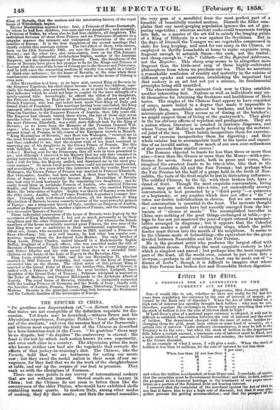THE EPICURE DT CHINA.
" DE gnstibus non disputandam est,"—a dictum which means that tastes are not susceptible of the definition requisite for dis- cussion. Yet feasts may be described,—witness Bruce and his Abyssinian experiences Peregrine Pickle's "feast after the man- ner of the ancients," and even the uneaten feast of the Barmecide ; and witness most especially the feast of the Chinese as described by a born historian-cook in the Times. "Dc gustibus" there may be no dispute, but "de dapibus" the controversy is eternal : the feast is the test by which each nation knows its own superiority, and even each class in a country. The Abyssinian pities the man who knows neither raw beef nor the vegetable that corrects the effects of that jockey-in-training's diet. The Chinese, like the French, hold that we are barbarous for eating our meats raw ; but they excel the model nation in their sense of our sa- vageness, for they find that we do the work of the slaughterhouse at table, and cut up the corpses of our food in presence. They rank us with the aborigines of Formosa.
There are some points in any survey of international cookery that are not without interest. Stewed snails are a luxury in China ; but the Chinese do not seem to fatten them like the countrymen of the elder Plinius, who would have exhibited shells containing many quarts. In modern Italy, among other modes of cooking, they fry their snails ; and then the morsel resembles
the very gem of a mouthful from the most perfect part of a knuckle of beautifully roasted mutton. Disraeli the Elder com- plains that our meat-gorging population ignores the art of pre- paring vegetables ; whereas ancient cooks could transmute turnips into fish, as a master of the art did to satisfy, the longing palate of a Ring of Bith7nia in a war against the Scythians. But in the days of Disraeli the Younger we see vegetables compressed in slabs for long keeping, and used for our army in the Crimea, or employed in thrifty households at home to make exquisite soup, fragrant enough to astonish Sinon—the cook, not the traitor; and cheap enough to " rile " Cobbett—of the Rejected Addresses, not the Register. This cheap soup seems to be altogether more fragrant than the birds-nest soup of those highly-cultivated philosophers from whom we purchase our tea. Thus we ascertain a remarkable confusion of crudity and maturity in the cuisine of 'different epochs and countries, establishing the important fact that cookery is an art but not yet a science, its fundamental principles being still unsettled.
The observations of the eminent Cook now in China establish another interesting fact. Nations as well as individuals may un- fit themselves for retaining the freshness and healthiness of their tastes. The staples of the Chinese feast appear to have consisted of soups, meats boiled to a degree that made it impossible to identify them, mouthfuls minced to bonbons, and hot wines in microscopic glasses. They accuse us of dining at the butcher's; we might suspect them of living at the pastrycook's. They glory in the too obvious effects of repletion and predigestion. They are a nation whose literature is couched in intricate diagrams and whose Venus de' Medici is made perfect by breaking the mdatar- sal joint of the toes. Their habits incapacitate them for exercise; want of exercise incapacitates them for digesting ; and their whole cuisine has to accommodate itself to the tastes and capaci- ties of an invalid nation. How much of our own over-refinement of diet proceeds from similar causes ! The Romans objected to feasts for less than three or more than nine—fewer than the Graces or more than the Muses—with a pre- ference for seven. Some poets, both in prose and verse, have imagined the sweetest feasts to be tete-i-tete, like that in the story of Noureddin Ali and the Fair Persian ; but perhaps when the Fair Persian bit the half of a grape held in the teeth of Nou- reddin, the taste of the fruit might be lost in distracting influences. The coddled Chinese, by the by, with their broken feet, have a dread of fruit. Though the most exquisite conversation, living poems, may pass at feasts tete-i-tete, yet undoubtedly average conversation is best promoted by a "third party "—a quincunx or a heptarchy, or any number which does not offer a "tie" of votes nor drown individualism in chorus. But we are assuming that conversation is essential to the feast. The ancients thought so ; our modern morals have but recently emerged from the bar- barism of "silence at meals." The accomplished traveller in China says nothing of the good things exchanged at table,—per- baRs he has not yet mastered the jeux-d'esprit uttered in monosyl- lables arranged in diagrams ; but it appears that the Celestial etiquette makes a pomt of exchanging slugs, which the polite feaster must thrust into the mouth of his neighbour. It seems to be the Chinese mode of hobnobbing—the equivalent for the grape divided between Noureddin and his Fair Persian.
He is the greatest artist who produces the largest effect with the smallest means. Perhaps the most exquisite cookery is that which is simplest and purest ; but perhaps also the most exquisite part of the feast, all the world over, cannot be put even into a stewpa,n,—perhaps in all countries a feast can be made out of "a dinner of herbs"- though it is difficult to imagine that where the Fair Persian has broken feet and Noureddin broken digestion.


































 Previous page
Previous page